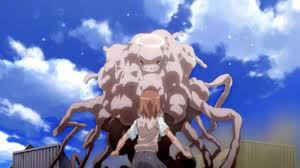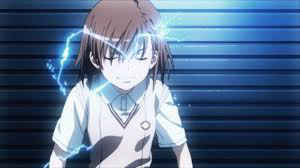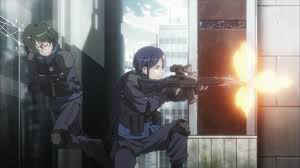

 |
 |
||||
| Home | Reviews | Extras | Forums |
|
A Certain Scientific RailgunSynopsisIn Academy City, a technologically advanced city in which the vast majority of the population consists of students, researchers, and teachers and in which espers are commonplace, Misaka Mikoto is one of just three "Level 5" espers in the entire city and thus one of its most powerful people; she's nicknamed the "Railgun" due to her ability to cast electrical blasts. Together with her roommate Kuroko Shirai, a powerful teleporter, and their friends Saten Ruiko and Uiharu Kazari, they come across the existence of "Level Upper", of unknown origin and nature but seemingly designed to artificially increase esper abilities, and they investigate the cause...only to come upon a darker secret, tied to all-but-forgotten clandestine research conducted by the City itself... ReviewTo refresh our memories: I watched and reviewed A Certain Magical Index several months ago, and to be frank, I really didn't think it was any good, not at all. An overly large and underdeveloped cast combined with an uninspired alternate universe makes for a show that's at best fantasy-action light novel-adaptation fluff and at worst a downright tedious slog. In typical THEM reviewer fashion, though, I came back to give its spinoff, A Certain Scientific Railgun, a try, and in this case, the general consensus I'd come across was fairly accurate: when compared to its predecessor, Railgun is more coherent and invests more in its central cast, and taken on its own terms it's a fairly entertaining if still flawed sci-fi fantasy work. I see Railgun as something of a shallow series, in part because of its own apparent lack of self-awareness as to how Orwellian its setting actually is, but one whose characters carry the story admirably, at least when they aren't engaging in the ecchi antics that they, sadly, do a bit too often for comfort. In regards to that last point, a major sticking point I have with Railgun is that with a virtually all-female cast, the shortcomings of its (male) author's skill at writing female characters becomes obvious. Like an increasing number of male-targeted manga and light novel series, female-on-female romantic elements are present throughout; unfortunately Railgun isn't content with this element being hammy as it, sadly, often is and makes recurring jokes out of Saten and Kuroko's attempts to flip up Uiharu and Misaka's skirts, respectively, and see their underwear and out of Kuroko's frequently groping Misaka with a crazed look in her eyes. It's not constant, thankfully, but having had the pleasure of seeing Aoi Hana and even some well-written female-on-female relationships in more mainstream series like Bodacious Space Pirates and Inari Kon Kon, my patience for this has worn thin, lately. These antics are especially irritating because they take up a considerable portion of the opening set of episodes, where we've yet to at all dig into the far more interesting primary plot; as another example, a character who becomes central to that storyline, the researcher Kiyama Harumi, initially appears as a distraction-prone eccentric genius known mainly for taking off her clothing in public. The point of this complaint, I suppose, is that in addition to its primary sin of being trite and symptomatic of badly-written female characters, this sort of humor clashes badly with the rest of the show. At least one denizen of the THEM boards commented that under different circumstances, the yuri elements could've been the best part of it, and I'm inclined to agree; with a bit less skirt-flipping, it might've been nice. Shame that the author felt like he had to play it for laughs.   It's also a shame because the cast is a pretty decent bunch, when you take away all the stripping and panty-exposing. I still am a little bit at a loss as to why Misaka Mikoto is quite as popular as she is, but in this series, she's far more likable a character than she is in Index, where her role is little more besides that of a tantrum-throwing counterpart to Touma, petulant over his doing as well as he does in spite of his supposedly being a mediocre esper. In Railgun, she's a bit more of a Mary Sue, frustrating in its own right but far more tolerable, and her admittedly impressive problem-solving ability is more entertaining than Touma's God Hand of Death being the solution for every problem. I'll make one last allusion to Index here, since you might have gathered by now that my advice is to ditch that series entirely and start here, and that is that Railgun's weakest moments tend to be when characters from that show rear their heads: Touma's occasional interactions with Misaka are as dull and full of tsuntsun-tantrums as ever, and Index and a handful of others make unwanted and unfunny glorified cameos in some of the one-off episodes (though seeing Touma's outwardly neotenic teacher hold her alcohol as well as she does is still somewhat amusing). In the meantime, Kuroko, when she isn't in the midst of invading Misaka's personal space, tends to be capable and enjoyable snarky, although she emerged from the show as my least favorite of the four main characters by a slim margin simply because she can feel like a foil and not much else. Of the other two, Uiharu is simply a rather cute and gung-ho info-gatherer and researcher who fulfills that role well; Saten was, in general, the character I liked most, in part because her being a character who lacks powers entirely is something of a refreshing perspective. She makes for a good sort of anti-hero character during an arc in which she downloads a so-called "Level Upper" software (the equivalent of taking drugs in Academy City, I suppose) in that it's perfectly reasonable, to me, that even someone who had tried as hard as possible to never resent her more powerful friends for their position would be somewhat awestruck by this possibility, which is indeed what happens (as opposed to her, say, having suppressed anger boil over). Furthermore, whereas Kuroko and Misaka come across more as best-friend characters whom the show wants to pair for fanservice's sake, there's a clearer sense of affection between her and Uiharu that never becomes explicit enough to resemble an out-and-out relationship (sigh) but does at least make it become easier to be emotionally invested when Uiharu gets stuck trying to rescue Saten from the effects of Level Upper, as eventually happens. The side characters aren't bad, either, and the key fact that Railgun seems to have nailed down is that less is often more when it comes to deciding how many. There are several one-off episodes centered around the bit players in Academy City's shenanigans, such as Tsuzuri Tessou, a member of Anti-Skill (basically Academy City's SWAT team) who doubles as a rather clumsy, bespectacled teacher and who has an unexpected and rather adorable obsession with old Street Fighter-style beat-em-up arcade games. Such episodes work well because there aren't too many of them and they're self-contained enough to not take time away from the main storyline, but they're welcome because these characters have shown up elsewhere in the story and our having some insight into their lives is nice, as opposed to their simply being new characters appearing out of the blue and adding to an already over-extended cast (I can't seem to stop backhandedly badmouthing Index, can I?). Kiyama-sensei, meanwhile, serves as another compelling anti-hero character, at least once the show finds something to do with her that doesn't involve exposing her underwear; it's hard to talk about what she does or why she does it without spoilers, but I enjoyed having an adversary whose reasons for doing what she does and being as dangerously driven as she is aren't absurd, even if her methods are objectionable. Indeed, the one time we come across a more traditionally villainous character, near the very end, this becomes much more apparent, for said character is your typical pleasant-facade-gives-way-to-cackling-megalomaniac evil genius carrying out somebody else's will with no real purpose of their own.    Indeed, Railgun's characterization isn't especially deep, nor is there much to its story beyond it being a somewhat entertaining series of sci-fi fantasy stories, but it's competent at what it does. It stays true to its original focus around four largely pleasant main characters, knows when and when not to introduce or expand upon side players, and ties its first season together nicely by having its first and final story arcs relate directly to each other, such that there's room for character growth and the series feels like, well a series as opposed to a slapped-together set of vaguely-similar vignettes. The fanservice, aside, I still have to ding its score somewhat for having a number of episodes that feel like a waste, which tend to be those bits (such as a variation upon a beach episode) that center around the four main characters but don't really advance the plot. Indeed, the irony of Railgun is that it manages to do a pretty good job of keeping its cast from over-expanding and spending the time needed on what peripheral characters it does introduce, but then squanders the episodes that could, potentially, help develop the personalities of our leads on ecchi antics and dumb jokes (such as Misaka's obsession with age-inappropriate childish clothing). My other main criticism of Railgun might perhaps be a bit too grounded in my personal views, but I can't let it slide: Academy City still doesn't make very much sense, as a setting, but what we do learn about it suggests to me that it's something of a totalitarian state. The sheer amount of information about people and their powers that Anti-Skill and Judgement (more-or-less the police) have at their disposal would make Edward Snowden blanch, and said agencies, members Kuroko and Uiharu included, frequently employ this information, along with supposedly classified knowledge about characters' research, whereabouts, and personal background, at crucial moments during their confrontations with Kiyama and others. Given that Railgun never exactly has either Kuroko or Uiharu question the ethics of this, while still presenting them as abjectly "good" characters, I'd venture that its original author and screenwriter either aren't aware that these are gross privacy violations or simply don't care. It's also somewhat telling that Anti-Skill and Judgement have an abjectly benign face (Tessou in the first case, Uiharu and her cohorts in the second) while a good number of their adversaries, such as a good number of the Level Upper users, appear as little more than thugs; in Academy Cityk it appears to be implicit that if you're falling by the wayside, it must be your own fault. Indeed, perhaps I found Kiyama's story as compelling as I did because I found Academy City, with its bureaucratic red tape and police-state ethos, to be a bit more sinister than intended, and somewhat sympathized with the intensity of her frustration with it. I liked Saten in part, too, because she's one of the few low-power characters depicted sympathetically, but even in her case, the show treats her and her insecurity somewhat condescendingly after the Level Upper incident passes, having her relegated to something of a bit player. Basically, Academy City may be a pretty and technologically advanced place, but there's a somewhat dark underbelly to it that Railgun, in my opinion, doesn't want to acknowledge, and it's thus probably one of the fictional universes that I'd least like to live in.    That being said, I do have a fair bit to recommend about A Certain Scientific Railgun: once you get past some fanservicey and tedious opening episodes, there's a good story in here, and it makes for solid if not especially deep or well-written entertainment (and one whose animation and artistry are pretty solid, to boot). Quite frankly, I'd say ditch Index and try this series if this universe interests you in any way; Academy City still sucks, but this time, the characters don't. As shounen fantasy/sci-fi adaptations go, it's pretty good, but it's definitely a bit indebted to the conventions of that genre and, thus, not especially deep or self-aware. — Nicoletta Christina Browne Recommended Audience: Teenagers and up should be fine. In spite of my complaints about fanservice, there's very little actual nudity, just a lot of groping, skirt-flipping, and panty-peeking, which is bad in it's own way but won't make the American Family Association blanch as much, though feminists (myself included) might not be pleased and LGBT people might not appreciate Kuroko's sex-crazed behavior. It's also fairly violent, but there's little bloodshed and few (if any) people actually die; there is, however, a bit of disturbing bodily-horror imagery during several of the battles (think the final scene of Akira or the angels in Evangelion). Version(s) Viewed: Stream courtesy of FUNimation.com (Japanese with English Subtitles) Review Status: Full (24/24) A Certain Scientific Railgun © 2009 Kazuma Kamachi/Motoi Fuyukawa/ASCII Media Works/Project-Railgun |
 |
|
| © 1996-2015 THEM Anime Reviews. All rights reserved. |